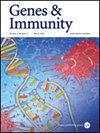Comprehensive analysis of autophagy status and its relationship with immunity and inflammation in ischemic stroke through integrated transcriptomic and single-cell sequencing
IF 4.5
3区 医学
Q1 GENETICS & HEREDITY
引用次数: 0
Abstract
Ischemic stroke (IS) significantly impacts patients’ health and quality of life, with the roles of autophagy and autophagy-related genes in IS still not fully understood. In this study, IS datasets were retrieved from the GEO database. Autophagy-related genes(ARGs) were identified and screened for differential expression. A prediction model was constructed using machine learning algorithm. WGCNA was employed to analyze differential regulation modules among different clusters of stroke patients. The analysis results were validated using single-cell sequencing data. Finally, autophagy hub genes were validated in an external cohort and an IS mouse model. We observed suppressed autophagy states in IS patients. A diagnostic model with good clinical efficacy for stroke diagnosis was constructed based on the selected key genes (AUC = 0.87). Consensus clustering identified two IS subtypes with distinct gene expression patterns and immune cell infiltration. scRNA-seq data analysis confirmed downregulation of pexophagy in IS. CellChat analysis identified key signaling pathways and intercellular interactions related to pexophagy. Validation in an external cohort and IS mouse model confirmed differential gene expression, supporting the involvement of pexophagy in IS pathogenesis. The identified key genes, molecular subtypes, and cellular interactions provide a foundation for further research into targeted therapies and precision medicine approaches for IS patients.

综合转录组学和单细胞测序分析缺血性脑卒中自噬状态及其与免疫和炎症的关系。
缺血性卒中(Ischemic stroke, IS)显著影响患者的健康和生活质量,但自噬及自噬相关基因在缺血性卒中中的作用尚不完全清楚。在本研究中,IS数据集从GEO数据库中检索。自噬相关基因(Autophagy-related genes, ARGs)被鉴定并筛选差异表达。利用机器学习算法建立预测模型。采用WGCNA分析不同脑卒中患者组间调节模块的差异。利用单细胞测序数据验证分析结果。最后,自噬中心基因在外部队列和IS小鼠模型中得到验证。我们观察到IS患者的自噬状态受到抑制。选取关键基因构建临床疗效较好的脑卒中诊断模型(AUC = 0.87)。共识聚类鉴定出两种具有不同基因表达模式和免疫细胞浸润的IS亚型。scRNA-seq数据分析证实了IS中噬噬的下调。CellChat分析确定了与食腐相关的关键信号通路和细胞间相互作用。外部队列和IS小鼠模型的验证证实了差异基因表达,支持食腐参与IS发病机制。确定的关键基因、分子亚型和细胞相互作用为进一步研究IS患者的靶向治疗和精准医学方法提供了基础。
本文章由计算机程序翻译,如有差异,请以英文原文为准。
求助全文
约1分钟内获得全文
求助全文
来源期刊

Genes and immunity
医学-免疫学
CiteScore
8.90
自引率
4.00%
发文量
28
审稿时长
6-12 weeks
期刊介绍:
Genes & Immunity emphasizes studies investigating how genetic, genomic and functional variations affect immune cells and the immune system, and associated processes in the regulation of health and disease. It further highlights articles on the transcriptional and posttranslational control of gene products involved in signaling pathways regulating immune cells, and protective and destructive immune responses.
 求助内容:
求助内容: 应助结果提醒方式:
应助结果提醒方式:


